TLDR: Yes! But keep reading to see what these seven plein air painters had to say when I asked them for their responses to a question that all creatives hear in their minds at some point.
As a bonus to inspire you, check out the simple contest below for your chance to win over $200 in art supplies from Winsor & Newton!
Question: If someone said to you, “I’m not talented enough to paint,” what would be your response or advice?
Mark Fehlman, Christine Lashley, Johanne Mangi, Garin Baker, John Hughes, Paul Kratter, and Joe McGurl share their answers here. Stay tuned – in a few weeks, you’ll see what additional artists from the Plein Air community had to say.
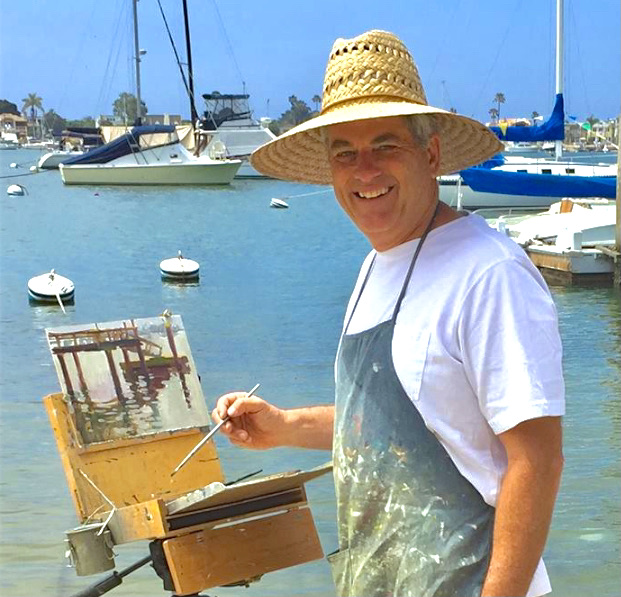
“I hear that all of the time, but I have seen doctor and lawyer friends that said the same thing, and with hard work have become very good artists. The principles are very learnable. Be careful though…plein air painting is highly addictive.” ~Mark Fehlman (markfehlman.com)
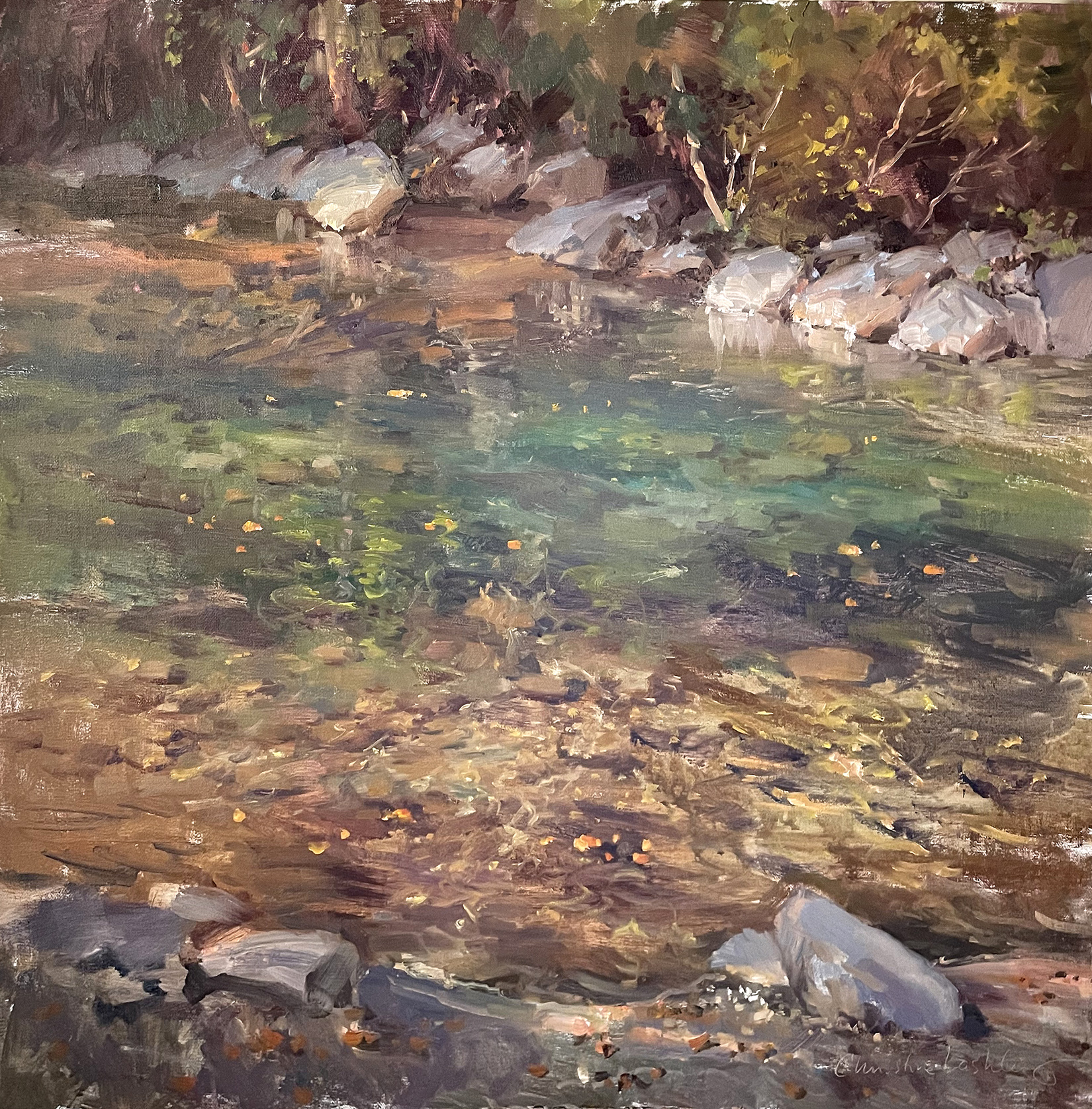
“Nobody was born painting. We all start somewhere. Pushing paint around or making marks is fun, and anyone can do it. The tricky part is as you gain skill and develop your creative eye to not become overly critical or overwhelmed with how much there is to learn. There is never an end to the creative journey. Of the artists I know, the more seasoned or ‘talented’ the artist, the more they feel they have to learn.” ~ Christine Lashley (christinelashley.com)
“I’m not talented enough to paint!”
“I would say, ‘Me neither!’ It takes desire, joy, dedication, a brush, some paint, and something to paint on. That’s it. It’s not about talent. That’s a lame excuse. Bring it on!” ~ Johanne Mangi (johannemangi.com)
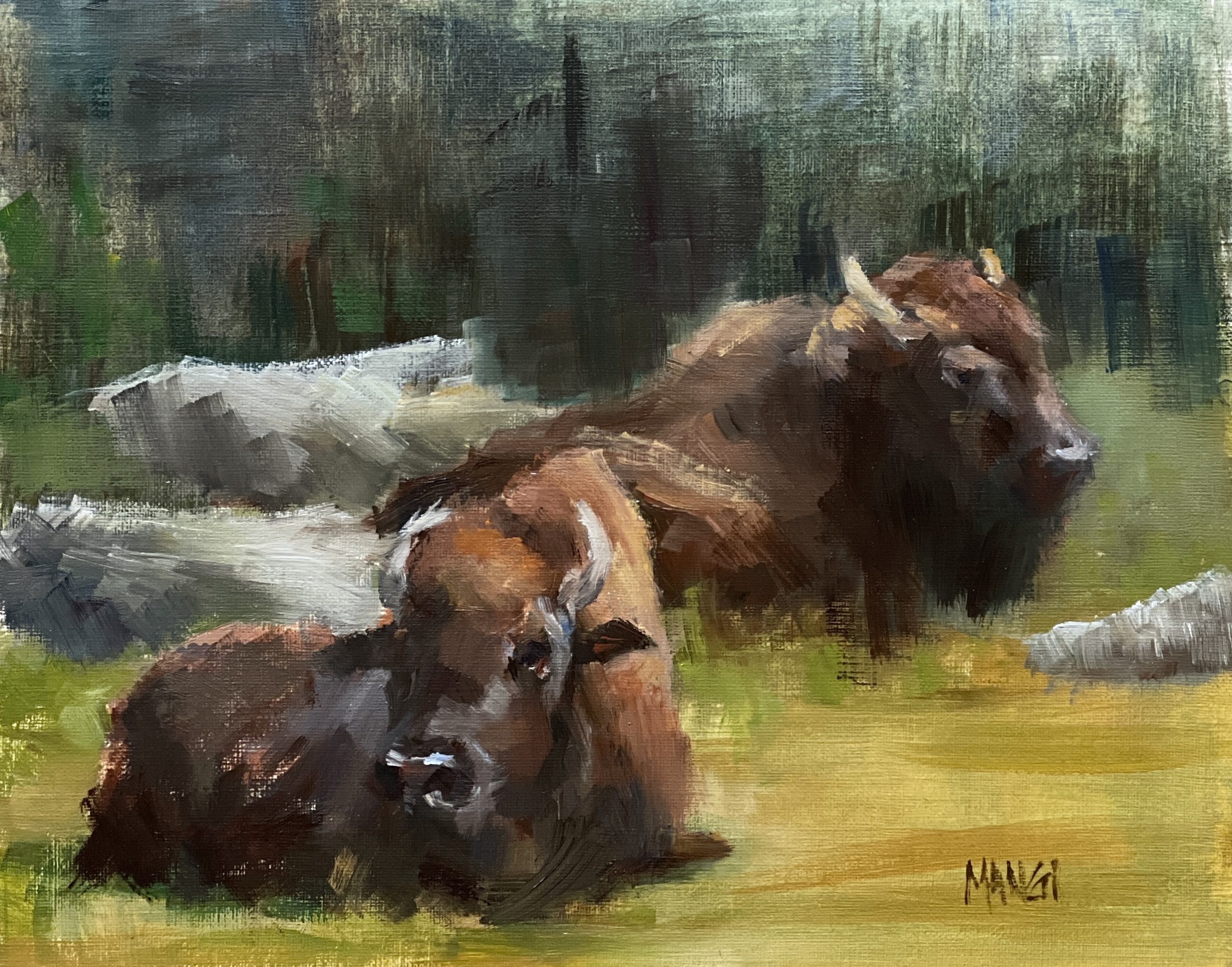
“I hear all the time from students, ‘I have no talent … I can’t even draw stick figures.’ I say ‘Good!’ Neither is required. The only requirement is your interest in this playful exercise and building from the basics of perceptive and intuitive responses to the energy of life and light all around you. Be patient with yourself, don’t stop! Keep it flowing through your senses, out of your hands, through your brushes, and onto the surface.
“Through these attempts over time and as the paintings pile up, embrace the mess of color as your personal voice and experimental expressions at that moment.
“Trust your growing confidence in this exercise and the act of simply seeing and creating. You’ll be surprised how many miracles will happen right in front of your eyes!” ~ Garin Baker (garinbaker.com)
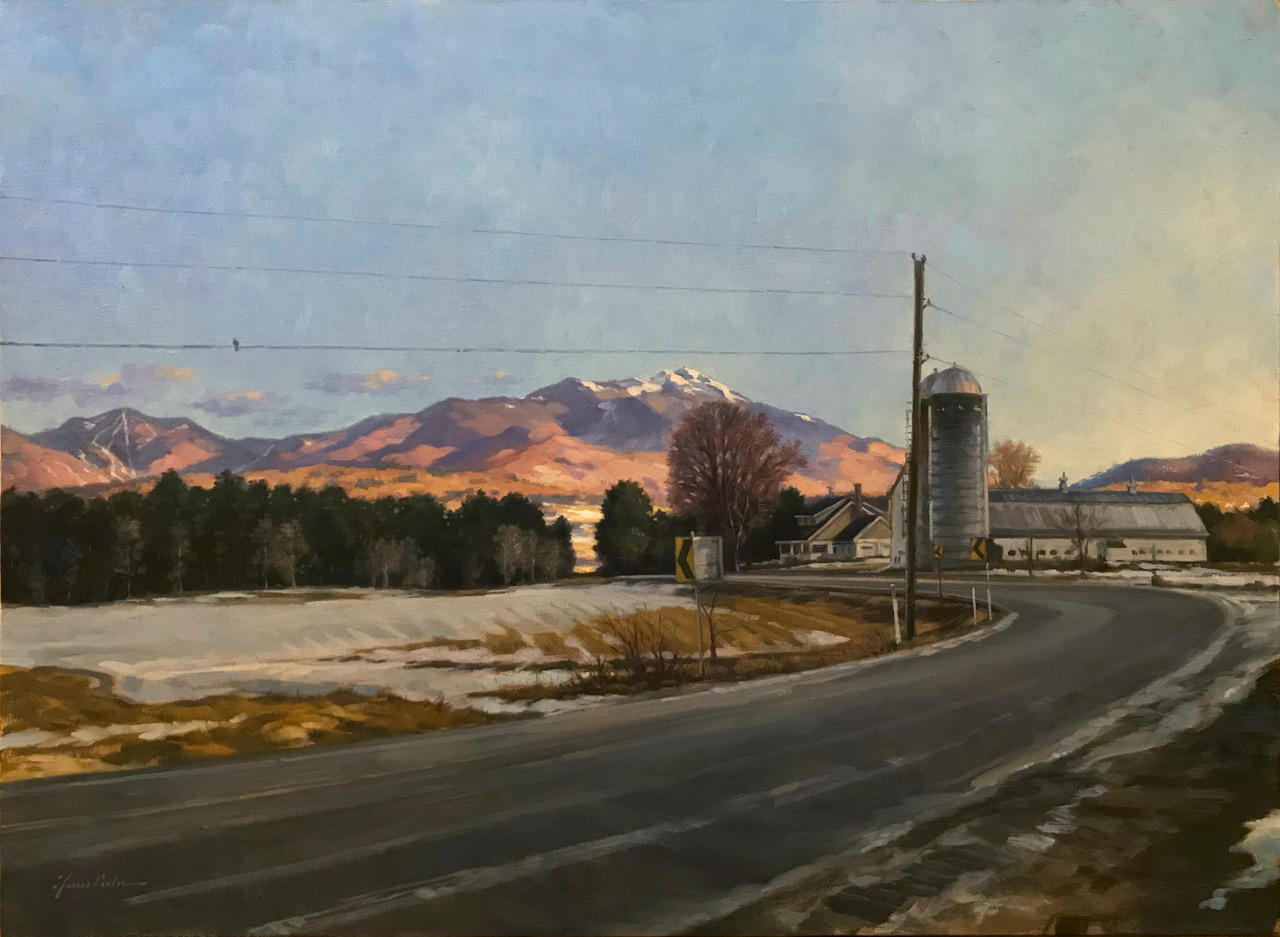
“It really comes down to what you are interested in. If you are interested in painting, then paint! Do you really have to be the best painter in the world to enjoy doing it? What does it matter anyway, if it makes you happy? One of the greatest rewards of painting is making new discoveries and the challenge and satisfaction of improving your art, even if it takes a lifetime. After all, art is not a contact sport, and no one’s keeping score unless you decide to enter a competition, and that’s entirely up to you.
“When it comes to painting on location, the famous artist Robert Wood once said, ‘The pleasure and sunshine should be your greatest reward!’ Add to that the ability to appreciate beauty, and the wonderful friends you will make to boot! Some of the finest people I know paint and many of them have become lifelong friends regardless of their skill level or status in the art world.” ~ John Hughes (johnhughesstudio.com)
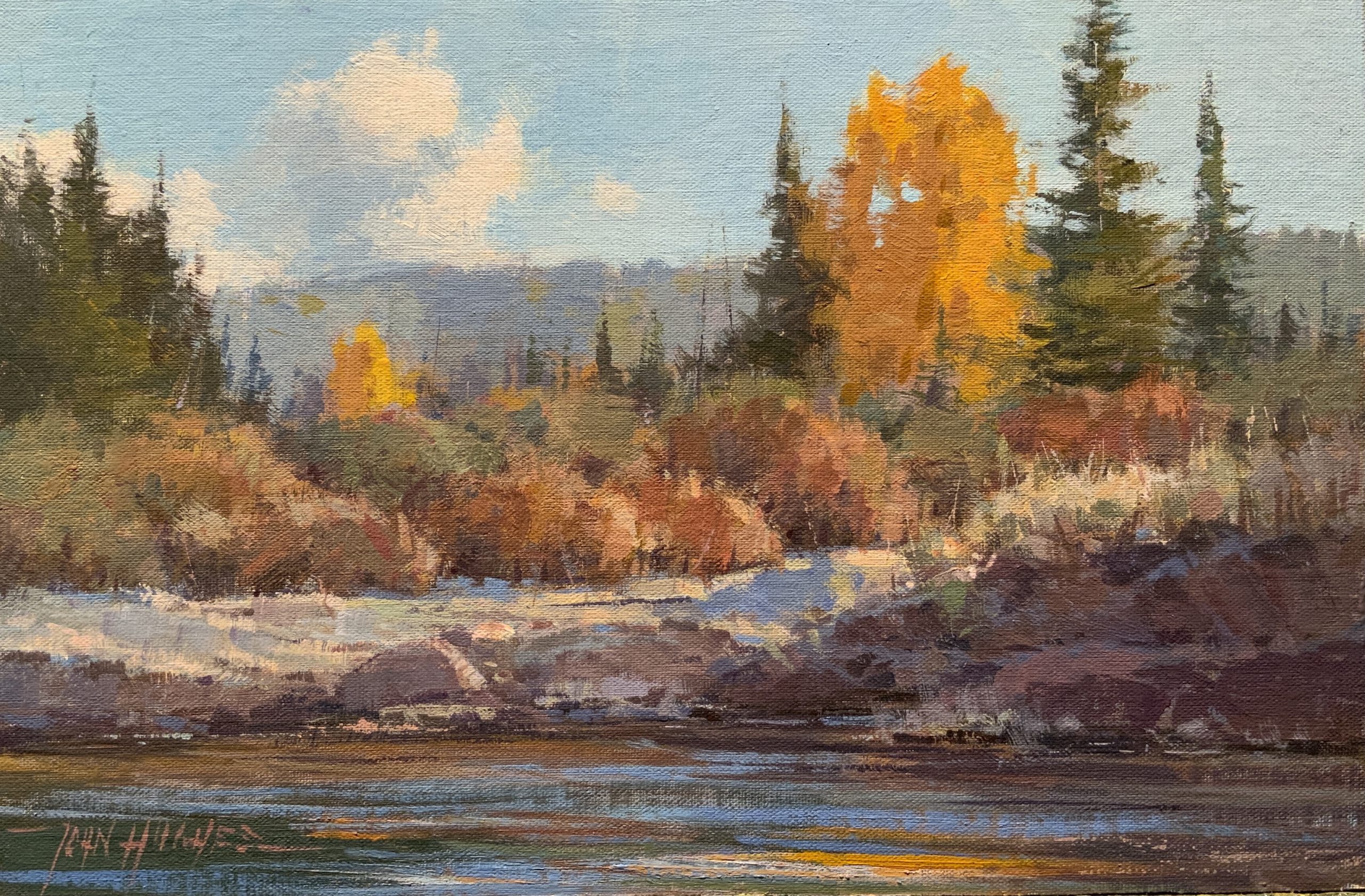
“Maybe you’re not the most talented painter but if you’re a visual person you can learn. It’s not easy at all but it brings me so much joy and satisfaction. I have a great attitude; even if I struggle, I ALWAYS have fun! My advice would be to get a sketchbook and all the other equipment to enjoy the experience. Practice and don’t set the bar too high. Join a group of other like-minded artists to share ideas and painting adventures.” ~ Paul Kratter (paulkratter.com)
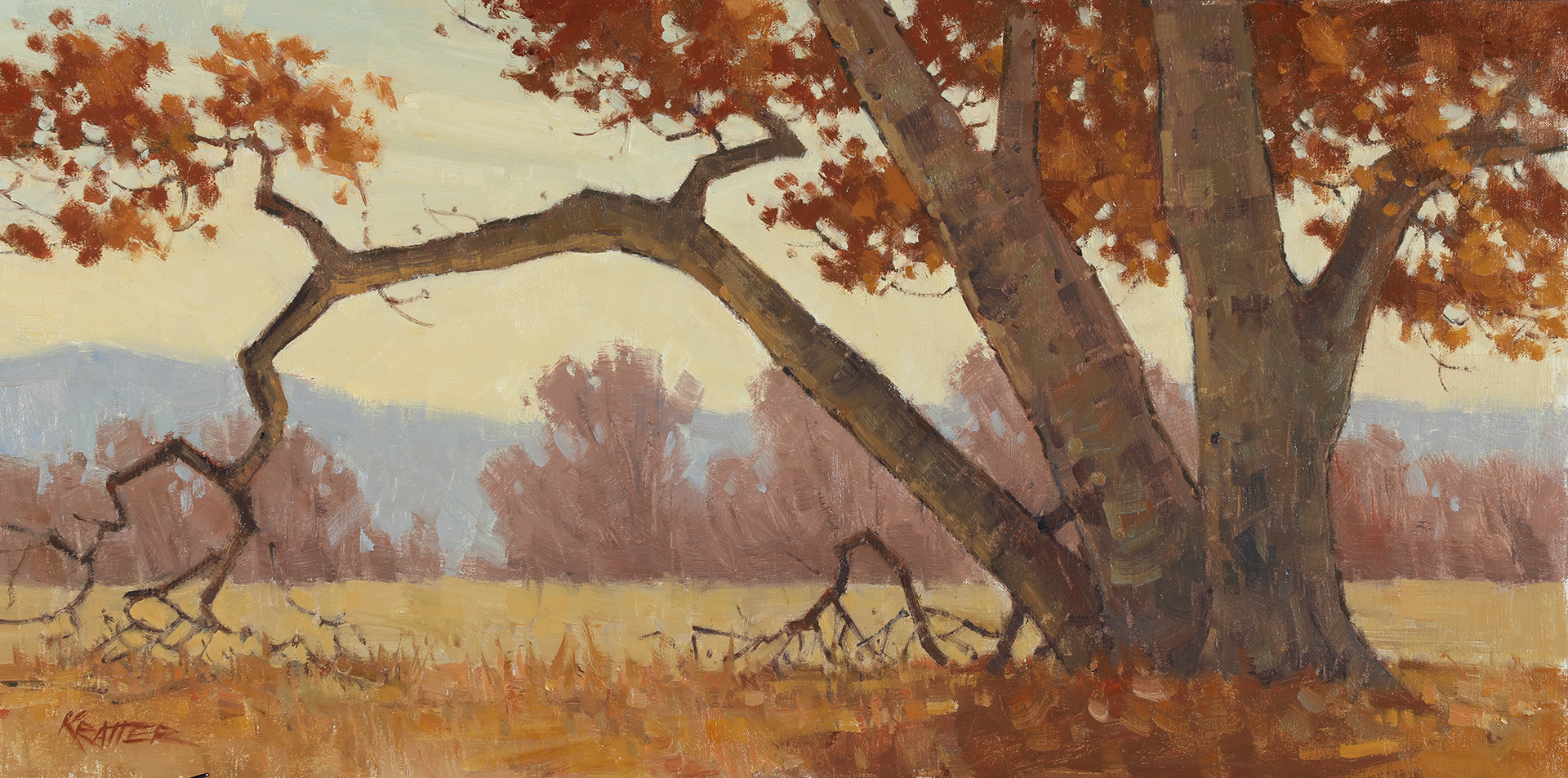
“Don’t worry about the result, and don’t compare yourself to professional artists. Many golfers do not golf well when compared to professionals. Even so, they continue to go out every weekend and enjoy the game. That’s what’s important – enjoying the process, not the end result. Too many amateur artists fret over their finished paintings. Instead, they should find gratification in an activity they love to do and which adds to their quality of life.
“The unique aspect of visual art is that, unlike many other hobbies, there is a product that results from the activity; however, it is your choice whether to put it out there on display or keep it in your studio. Find satisfaction that you are always learning something new and improving your skill, and that is what keeps us going. Just like golfers, we know we’re getting a little better each time we enjoy our ‘sport.’” ~ Joseph McGurl (josephmcgurl.com)
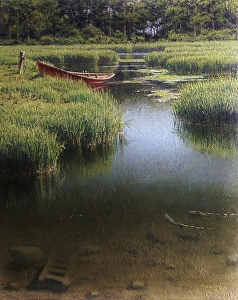
The next time you hear a criticizing voice – in your mind, or even from another person – remember today’s advice. What would your advice be to a fellow painter?
And browse more free articles here at OutdoorPainter.com

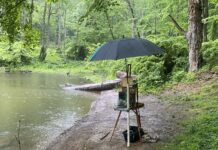
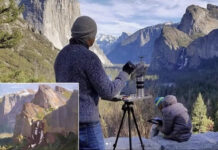
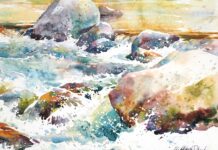
I started painting after retirement and recently put my work out there for people to see. So many responses have been, “you are so talented” and I just smile and say “thank-you.” But I know there is no talent involved, just a lifelong love of nature and the joy of putting it on a canvas. I was blessed to have started this endeavor during Covid which gave me time to work and to learn from all the wonderful artists who share their process online.
I remember John Sanden saying “ we are all on the same journey but we are all on different parts of the journey”.
The best advice… the voices you hear lie! They are really just the people that do not want to see you succeed. Don’t give up! Don’t quit! That next painting could be in some gallery somewhere or you may need to make a mess to learn something! So, take the brush, take the paint, take the canvas or paper and do it for you! (I need to take my own advice and quit being afraid and go out and paint with my friends -they don’t care how good or bad – just that I get out there)!
My advice to a fellow painter would be, “Don’t be afraid to create bad art.” Too often, people are afraid to begin creating art because they hold themselves to a high standard of perfection; they believe art is a matter of innate ability, not hard work. The truth is, most of us began as artists creating terrible art — art that wasn’t cohesive, art that made no sense, and art that some of us would prefer never to see the light of day. As an artist, pushing through my perfectionist tendencies and making “bad art” is what propelled me to figure out what works and what doesn’t work in my art, leading me to become an immensely better artist than when I started out.
Go ahead and create 15 bad paintings. Get them out of your system! Then relax and enjoy painting. Don’t be so attached to the outcome, it’s the process of painting that matters. Enjoy every moment of it.
I re-read the book , “The World According to Garp,” by John Irving recently. Garp is a writer who has numerous episodes of writer’s block. Garp names the book when he starts to keep focused. I do the same when painting. Name the painting to stay on task, paint with purpose, not forgetting what attracted you to the scene in the first place.
Give yourself permission to fail. Only when you are playful, experiment, and “go outside the box” can you reach another level of ability and confidence.
Good luck and May God Bless.
When adults comment that they can not paint I start asking questions. Did you use crayons and color as a child….sometimes within the lines and sometimes not ? Do you know what you like when you look at any kind of art or photography ? Are you aware of the beauty in nature ? Do you like being absorbed in what you are doing ? If any of these ring true for you it is likely you could be an artist. The heart and desire come first and the techniques can be learned.
My 7th grade art teacher really criticized the way I painted a pear. I never wanted to paint until I was in my 40’s. Then I remembered how much I loved that pear I painted. I have since learned to listen to my own voice and to remember how much fun it is to paint something I love. Just do it!
Keep painting. Enjoy the process. Revel in the rich colors and the feel of paint on your brush. Just have fun and keep painting!
I have a great appreciation for and have been drawn to Plein Air painting for several years now. This article hits the nail on the head for me. I want to do it, but the voices I my head tell me I have no talent and I would be wasting my time.
I watch videos and read articles, but never get beyond that. If I had started painting when it first came to mind, I would, at this point, at least, have three years more practical knowledge and experience than I do now.
Everything is relative, especially art. Different things appeal to different people in different ways. Never compare yourself to others (very hard to do though). It can not only ruin your self-esteem but also may hold you from creating something completely new, something that others don’t do or make. Just take the brushes and paints, play with them, dance with them, and enjoy the road!
My advice would be to try and quell that noise in your head , and not compare your work to other artist’s work , but to learn from them. What did you like about what they painted and study it. In person with that artist if possible , but just really looking at the painting , the brushstrokes, the palette , the mood it evokes. Not every master signature artist will paint a masterpiece and neither will you. Just enjoy the moment.
I have been a hobbyist painter for decades but only recently when I started to devote time to paint consistently have I seen that my ability is improving and I might just be good enough to become a painter! So exciting!!
There is so much more to painting then getting paint on paper or canvas! It is an incredible journey of learning, interacting with other artists and the sheer joy expressing the beauty we are surrounded with. There is always something to paint or draw and always room for improvement. The art community is a wonderful place to make new friends from all walks of life who are more then willing to help you learn and develop.
Whenever that critical voice pops into my head I tell myself “just keep going.” You’ll learn so much more if you spend the day doing a bad painting than if you didn’t paint at all! I try to see my painting time more as a practice, rather than putting pressure on myself to produce great results with every painting session.
There’s a saying referring to art, “If you want to do something simple, try brain surgery”. The great part about painting and art is that you get to learn, and express, and have success and failure. Painting is a life skill. Enjoy the journey and see where it takes you. Take a chance. Pick up a brush and some paint.
First- just show up. That’s a success already. Lots of other people are at home sitting on their couch watching TV! Then, when you start and that inner voice says “you can’t do this”, talk back and say– “yes I can– I’ve done it before and you can’t stop me”. It’s like a wrestling match. I always enjoy the multiple weird encounters that happen– each plein air trip is an adventure to be remembered by the painting you take home- no matter what it looks like. One memorable time, the painting fell off the easel once finished, landing face down in the dirt. It created some really interesting marks I wouldn’t have made deliberately- and was improved!
It’s just paint…push it and move it around until you like it. And if you don’t, try again. Most of all have fun and get messy!
If you have the desire, the rest will come. Vincent Van Gogh had no formal education, Henri Rousseau, a clerk, started painting at 40 by attending an art class, and the list is endless….I started my “formal” learning at age 45, from mentors, classes, books and studying works of people whom I admired.
Painting is like learning a sport. You want to play, you buy the equipment, you learn the basic rules, you take your punches and in time improve.
One of my first plein air pieces sold at an art show and the rest has been a joyful adventure.
I tell people anyone can learn to paint, it’s kind of like learning to play the piano… you have to start by learning some basics, and then practice, practice, practice! You might struggle over the same same challenges for a time, but then suddenly a breakthrough happens – you figure it out and “tada!!! Look at that, I did that!” It’s what keeps you going. I agree with someone who said, the more you learn, the more you feel you have to learn. So just make peace with that. You’ll always be learning, struggling, and striving to get better. That’s life!
Use criticism and advice to your advantage; find the positive in advice. But never let it discourage you. Pick yourself up, lick off your wounds and get even better. Find even more joy. Mentor others. But never let pride hinder you from growing in any aspect of life.
If you see something you like take a photo to remember how it looks. If you want to remember how it made you feel , paint it. Just putting one color down next to the other will put your emotions about the setting in that space and time.
You dont have to be a Monet or Van Gogh, just be you feeling the sun and breeze in that space and time .And have fun with it. Like everything else in life you get better the more you do it
Thanks so much for this article. It is so very encouraging to me to keep going and especially to focus more on the enjoyment of color and “pushing the paint around.” Agree completely with painting with a group. This has greatly enriched my life and improved my painting!
Wonderful article! Had been a studio hobbyist for 6 or 7 years. Retired this past March and haven’t stopped plein air painting since! Excellent, excellent advice here!
The more you paint, the “better” you paint. There are so many choices of what and how to paint. Draw and paint all you can and have fun with it. Your talent is to learn and share with the world. Inspire others. You can do it!
Painting is fun, but to get better, I need to paint everyday. Even though is it fun, the discipline of painting everyday can some days feel like drudgery. Honestly, just paint on those days. You will be glad you did, and the next day you will be over yourself, and paint better, and enjoy it more.
Gosh…since I myself am six months into wondering if there is an artist in me – finally at age 63 I’m taking the time to pursue art with absolutely no prior training…..my quick reply/ advice would be. Start – start – start something somewhere. Take a workshop, visit galleries, go to the art section of the library (yes old school, there’s something about the paper trail that you get lost in) look at everything in a new eye and start. Be easy on yourself, this is to be a loving journey, not added stress. Chat with fellow artists- they are a wealth of knowledge and their passion is contagious. Then when you find a medium / technique that moves you…. JUST DO IT!! You will not be an expert but you will continue to grow each time you place brush in hand, pastel to board, pencil to paper. That’s what’s working for me – and even if only for my pleasure- I am enjoying this new path. ❤️👩🎨
Creating a painting should be enjoyable, something you like doing. Getting bogged down in techniques and detail is frustrating. Don’t get me wrong, art has its rules, creating a good composition and value plan, its line for emphasis and color for mood, etc. etc. etc. Painting should be enjoyed, paint outside the lines, paint bigger, paint smaller, try different venues, join an art group, but paint, paint, paint and sooner or later you will find your way, the techniques will become second nature, details will become larger masses of light and color, the composition will flow and you will have become an artist.
When I was diagnosed with an autoimmune disease that has affected my vision, balance, and stamina I feared I might not be able to paint again. When I (sort of) got back on my feet I wrote a command that I now repeat daily: “Accept your limitations and live big!” I still have difficulties but my painting is improving, I continue to learn, and the joy never ends.
When people comment how lucky I am to be a talented painter I have two responses for them. The first is that I have worked on my painting skills for years and still to this date am always reading and learning more to make myself a better painter. The second response is that everyone has some sort of talent but it may show up in them in a different way. Some people play instruments, others dance and I paint.
All you need is desire to be an artist. Some people don’t feel their work is good enough to call themselves artists. You don’t have to call yourself a good artist or bad artist. Just paint and you are an artist. Mix a touch of hope with your desire and you have it!
Simplicity. Paint like a child. I find it’s very hard to do but I am constantly striding towards that end.
It is funny the way we think of ourselves and our work, when rest of the world around mostly compliments our work & skill as artists. The key is to just paint, just enjoy the process without any self criticism or fear. There would be always someone to appreciate it. Always!
As an older adult and former nurse, I tell seniors we need a hobby that is social and creative. Art and painting has done that for me. A couple of us talked about plein air painting for a couple of years then finally invited a a few others and we jumped in. We are now about ten and go out weekly nearby even if only two to five can go. We have learned so much this past year, and been such an encouragement to each other. We love the fresh air and fellowship, and seeing what happens with our painting.
What is talent? It’s kind of like nature vs. nurture–are you born with it or does it develop with work? I think it’s both. I’ve always painted and drew–but studying and learning over the years has definitely improved my painting! Also, I now have more skill to do what I want.
However, I find that if I don’t do it for any length of time, I need to refresh my skills by taking workshops again, especially for figure drawing and painting.
Plein air and sketching are like meditation for me–I love the concentration and zoning in that they give!
Do you love what you see? Does color excite you? Do you see images in the clouds, or on a piece of tile that has a design in it? Are you passionate about faces, flowers, landscapes, seascapes, shop windows, textiles, photography? Our creative minds present endless opportunities for our imagination to work. A paintbrush applied to a surface begins the process and once you get to this first step it is a journey to exercise your mind every single time. Of course we want others to enjoy what we create, but begin by pleasing yourself and enjoying the process. Professionals in any field have put thousands of hours into learning their skill, so challenge yourself to get started on a path that will bring so much pleasure!
Find a friend, or group of friends with common painting interests, and commit to one day of the week to get together and focus on art. You can take an online class together, or exchange ideas, share lunch, and be dedicated to doing art together. I have been doing this consistently with two friends, meeting in our art space (outside of our homes), for the last 25 years. It has been remarkable how we have begun as beginners supporting each other to becoming painters. We are very passionate about keeping our art day together a priority.
I enjoyed the article about talent and agree it is more about desire and enjoyment rther than good or bad (not always relevent ).
I think of each painting as practice for the next. Not an easy concept to apply, when I keep this in mind it allows me to learn from each painting experience and not look at my paintings as precious. I can enjoy the process and learn from both the good paintings and the bad ones. And yes, there are bad ones but often I learn more from my mistakes so even walking away with a bad painting is a successful day.
Simply-jump in and enjoy the process. Lose yourself to experimentation and discovery. Play! Art is so good for our psyche and the desire to create is all you need.
I often hear people say “I can’t draw a straight line!” I like to tell them “neither can I, and I have yet to see true straight line in nature. Also that is what rulers are for.”
Unshackle yourself from expectations and embrace the freedom to express yourself. I started painting last year, and it’s relaxing, maddening at times, but I’m getting better. Break the rules, play, have fun, and don’t concern yourself with what others think. It’s art-your art- it can be whatever you want it to be.#freetobeme #myartmatters
I first became interested in art when I was 8 years old. I couldn’t get enough of it and wanted to make a career of being an artist – until my parents pointed out the mystique of “starving artists” and said I should consider another interest that would lead me to a career with “earning” potential. Reluctantly I did just that, and after some 22 years in law enforcement and the legal profession, I retired and finally started looking at the “starving artist” and realized that there was no such person. I took up painting and haven’t been happier. Even my wife says I appear to be in a better mood these days. 🙂 If I were to be able to give my younger self, or anyone for that matter, advice about a career in art it would be don’t let anyone dissuade you from your dream. Go for it! Pursue art with all your heart and soul, and while you might not make a fantastic living at it you will be much happier than if you had been shoehorned into a job you didn’t want – just to make a living. And I would wish them good luck.
In my thoughts of my talents, I may be naturally talented as people see me. But on the other hand, I’ve always loved drawing & adding color to things of beauty whether landscapes, animals, people – you name it. To me, it’s a sense of self satisfaction, knowing I can do something with which God gave me. I have friends that say they can’t even draw a straight line, much less paint. I tell them, “In painting, there are rarely too many straight lines except if your going to be an architect or you’re going to paint a house, barn or some inanimate object. You paint from the heart and mind for the peace, the joy and the self-satisfaction derived from creating something from within yourself. You don’t have to show your artwork to anyone – be confident in the enjoyment you get out of it.”
This resonates with me! I have painted outdoors with a friend every week here in beautiful Down East Maine starting in July. We have both been extremely self critical, but very supportive and encouraging of each other. We are now learning to enjoy observing the world around us and letting go of pressure. I have learned so much and our confidence has grown. I love Garin Baker’s words, “this playful exercise” and “be patient…don’t stop!” Thank you for a great article!
Explore, draw and paint the local life all around you. You have a unique perspective of the world to explore and share. You’ll experience moments of timelessness and peace while creating for yourself and others.
It is just paint and a piece of paper with a brush—you are not responsible for world peace or the energy crisis. Enjoy! The store will have more—lots more.
I will always be grateful to an art teacher who advised me by saying: just put the brush in your hand. I hear this in my head every time I have negative thoughts and want to quit. As soon as you I get started, I fall in love with process.
My answer has been “there is no such thing as talent, just an immense desire to be free”. A chance to say in my own way, whether thru paint, pastel, drawing, or sculpture, how I feel towards the beauty around me or to relate a reaction to something I witnessed. Creating lets me make the decisions about composition colors, values . . . all the artistic fundamentals. All the choices are mine. Breaking the rules, trying something new, or sticking to tried and true it doesn’t matter. As long as I start the journey through my own imagination. That’s where I find total freedom. It is so addictive. And it is my way of communicating.
Anyone can learn to paint just like anyone can learn how to type, play the piano or play video games. Sure there will be errors but with practice those errors occur less often. Find a mentor, videos or online classes to learn processes and shortcuts from already accomplished artists then paint and have fun. You will be amazed by how quickly you will progress and how meditative it can be.
To be a painter, study! Sounds boring, but it really isn’t. When you take out “talent” out of the equation and solely base it upon curiosity, you start doubting your skills less. When I’m painting on location, my inner voice sometimes tell me, “Do you really have what it takes to paint that scene in front of you?!” But then I do it anyway because I’m curious how my mind will reimagine the landscape in front of me. Curiosity is enough to push you as a painter!
The fear of failure is ever present for me ,even after many years of painting but so is the excitement of a blank canvas . I feel so fortunate to have a life long love affair with art and as years go by it gets stronger and more challenging. For the person starting out on this journey and it is a journey I suggest enjoy and explore the possibilities find out what makes your heart and soul sing.
I’ve worried about them. I’ve hid from them. I’ve watched over my shoulder while questioning every stroke. Years later, I learned the truth: There are no art police! Don’t worry about rules, the right tools or the right way. Try! Try anything and everything! Experiment, play, repeat again and again. Most importantly have fun and enjoy the journey!
Someone commented that FAIL simply stands for “First Attempt In Learning.” Everyone who ventures in the creative world has some failures. It’s just part of the process. Learn as many techniques and skills as you need and then just practice and have fun. Embrace the failures as part of your learning and growing.
Probably everyone knows the saying, but I write it on the first page of each of my sketchbooks: You have to be bad at something before you can be good at it.
The more skills you learn, the less dependent you will be on talent.
“Talent” is the desire to try something you would love to do, and learn it and tweak it as you go. Don’t try to create the photo you are looking at or the scene in front of you exactly, the first time!! Remember this phrase, for anything in life: “this is how it looks (my paintings) while it is all coming together for my goal”. Everything including art, happens over a series of steps. And you might even surprise yourself! Even the best artists create paintings they don’t like and ditch them for a few months, few years or just sand down and paint over them.
Everyone who has less artistic talent than you thinks you’re a genius! So why don’t you join them? There will always be someone who you think is a better painter, but most of the time those people have more skills, that’s not necessarily more creativity. My advice, climb down off that crucifix and have a fun painting!
You are enough
Your art is enough
Life is enough
Create: you must
EVERYBODY is good enough to be an artist. Children paint with gleeful abandon. Too many times they get sidetracked in elementary school when someone (helpfully?) points out that their trees don’t look right, or that houses or horses or airplanes are not shaped that way. Nonsense! Take your brain back to that childlike wonder and add training on techniques and – most importantly – confidence that your mark making is an expression of you as a developing artist. Explore, give yourself time.
Don’t look at others. Just paint what you see and feel.
I have done some painting along the way but not consistenly. Too many blocks in my head such as “it won’t turn out as good as I want it to”, ” I have already forgotten all the things I learned”, ” I can’t decide what to paint”.
I am now 84 years old and am leading a paint class at a retirement center. I hear myself telling the residences all the things I should have been telling myself. You don’t have to have talent, we are here to have fun. The result is not important, the enjoyment of the time spent painting is what counts most. We are not comparing our work with others, just love what we are doing at this moment.
Along the way I do try to teach them a few of the elements of design in a casual way, such as lightening the sky color as it nears the horizon, this is called atmosphereic perspective, then explaning why that happens.
I hope that I can begin to take my own advice.
I think that talent is important, but persistence is more important, if improving as an artist is your goal. Being persistent by just getting out there and painting . You’ll get good paintings and , bad paintings that you will hate and paint over or hide in your closet. But, if you love to paint, just do it . For me painting feeds my soul. I know that sounds kind of deep , but I enjoy it and get lost in the creating , if it turns out good , that is a bonus!
Persevere is my motto. Of course you don’t like it, you aren’t finished with it yet! Push through until you have accomplished what you can, then put the reference away as you come closer to the finish line, (whether it is a photo or from life) and let your own creative ideas come into play.
So many say “I am not creative” and they think they have to paint from their mind. I say” how do you know how to paint it unless you know what it looks like?” I was set free as an artist when I realized my creativity could come from realistic objects right in front of me. Then you come to the most joyous part, putting the reference down and let your own ideas about the painting speak. And they will, even through the process. Just try, it’s fun and do not give up!
I would advise other artists to paint as often as possible, even quick 20-30 minute sketches. Like most any skill, the more you practice, the more progress you will see. And yes, sometimes there will still be a “stinker” of a piece, but if you don’t try, you can’t succeed.
You’ve probably heard the expression, “underpromise and overdeliver” which translates into not promising more than possible. I think we often expect our work to be better. Applied to artwork, this is about being compassionate to yourself (and others). I guess it would be about underexpecting and overdelighting. What part may have worked out, gone more smoothly, or led to more learning than expected?
Paint what makes your soul sing, your heart soar and speaks to your spirit! When I was in a phase of making wall hangings featuring chairs another artist stated that they were “nice” and then asked “ But what are you going to do with all of them. What purpose are they for”? After hearing those words, I put them away in a box in my cellar. They have been there over ten years now, never finished and my joy in creating them was diminished. It felt like I had wasted my time. Do what speaks to you and do it today, for our time on earth is short. Make Art for YOU!